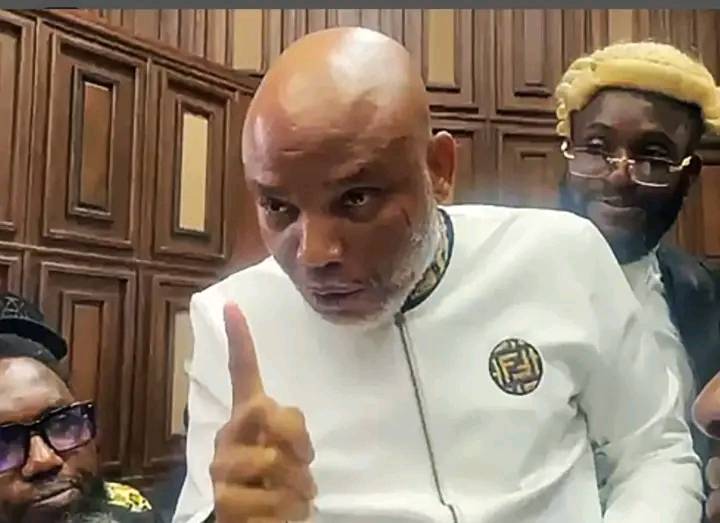Latest News
Court admits DSS report linking Nnamdi Kanu to #EndSARS violence despite objection

A Federal High Court in Abuja has accepted a report from the Department of State Services (DSS) that purports to connect Nnamdi Kanu, the detained leader of the proscribed Indigenous People of Biafra (IPOB), to widespread violence during the #EndSARS protests, including the deaths of 186 police officers and the destruction of 164 police stations.
Justice James Omotoso accepted the report into evidence on Thursday as proceedings continued in Kanu’s ongoing terrorism trial.
The document was presented by the prosecution’s fifth witness, identified only as Mr. EEE for security reasons, and introduced by lead prosecutor Adegboyega Awomolo (SAN).
EEE, a DSS operative, testified that he was deployed alongside a team to the South-East and other regions during the unrest, with the task of gathering intelligence and compiling documentation on the damage and fatalities recorded.
“I know the defendant through the media. I have never met him face-to-face,” he told the court.
The witness claimed that Kanu’s rhetoric encouraged attacks on security personnel and public property. The court accepted several documents as exhibits, including a damage report, death certificates of security officers, and a certificate of compliance—all submitted through the witness.
While the defence objected to the admissibility of these materials, the judge deferred a ruling on the matter.
According to EEE, the unrest resulted in the killing of 186 police officers, 37 military personnel, and 10 DSS operatives. He further alleged that Kanu’s inflammatory broadcasts led to the destruction of numerous police and INEC facilities across 17 states, naming Lagos, Abia, Anambra, Cross River, Delta, Ebonyi, and Rivers among them.
During cross-examination, defence counsel Dr. Onyechi Ikpeazu (SAN) questioned the credibility of the DSS findings and their connection to the defendant.
“You were not part of the investigation into the defendant himself, correct?” Ikpeazu asked.
“I was tasked to investigate the destruction of public property based on the statements of the defendant. He gave instructions to IPOB members to kill officers,” EEE replied.
Ikpeazu then queried whether Kanu’s alleged incitement was tied directly to the #EndSARS movement or to separate IPOB activities. He also questioned whether activists such as Aisha Yesufu, a prominent figure in the protests, were similarly investigated
“My assignment was not to investigate Biafra or individuals like Aisha Yesufu but to assess damage from the #EndSARS protest,” EEE responded.
The witness acknowledged that while the protests stemmed from genuine grievances over police misconduct, they were “hijacked by subversive elements” who turned them violent.
Pressed for clarity, he conceded that no part of the DSS report explicitly linked IPOB members to the fatalities. “It is a voluminous document. There is no single caption that links deaths directly to IPOB on any page,” he stated.
Further scrutiny by Ikpeazu revealed that several photos in the report lacked timestamps, and the document itself did not carry the witness’s personal signature. EEE confirmed that while he served as the report’s secretary, he did not sign it.
“You did not sign this report. In fact, none of the photographs show the dates they were taken,” Ikpeazu remarked, implying that the report may have been compiled after legal proceedings had already begun—a claim the witness disputed.
Following this, prosecuting counsel Awomolo maintained that the state had met its burden of presenting its evidence and urged the court to consider the material.
Kanu’s lead defence lawyer, Kanu Agabi (SAN), entered a no-case submission, signalling the defence’s intent to argue that the prosecution had not established a prima facie case.
Justice Omotoso gave both sides 14 days to file written arguments and an additional two days for replies on points of law.
Justice Omotoso adjourned the case to July 18 for the adoption of the no-case submission.

























